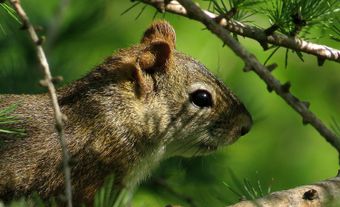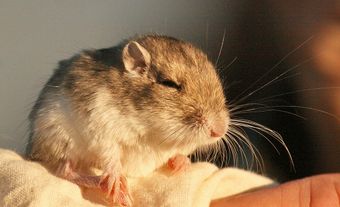Pocket Gopher (Geomyidae), family of medium-sized, solitary, nonhibernating, subterranean RODENTS. About 31 species occur in N and Central America, 2 in Canada. The northern pocket gopher (Thomomys talpoides) lives in southern Manitoba, Saskatchewan and Alberta, and in south-central BC. The larger plains pocket gopher (Geomys bursarius) barely extends into Canada via the RED RIVER valley, Man.
Description
Pocket gophers have a round body, small eyes, short ears and tail, and large, curved claws on the forefeet for digging. Their short fur is grey to brown and can lie in any direction. They carry food or nesting materials in fur-lined, external cheek pouches, which they empty with their forefeet. The mouth closes behind ever-growing, gnawing teeth, enabling the rodent to harvest underground vegetation and to excavate networks of tunnels in PRAIRIES and mountain meadows without ingesting earth.
The fan-shaped mounds they raise are burrow exits, and are usually closed with round, earthen plugs. Except during the brief mating period and when the female is raising young, they live solitary lives. Each year 1-2 litters of 2-11 young are raised in deep tunnels.
Biological Importance
Pocket gophers damage crops but also aerate soils and bring nutrients to the surface.

 Share on Facebook
Share on Facebook Share on X
Share on X Share by Email
Share by Email Share on Google Classroom
Share on Google Classroom







